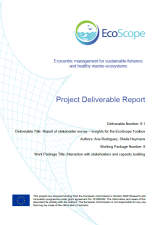
The aim of the survey was to understand the main needs, challenges and barriers of stakeholders that will be using the EcoScope tools and/or their outputs in order to better plan the development of these tools. The survey was sent to 33 stakeholders from 21 different organisations representing key European stakeholders in fisheries management, of which 18 individuals provided responses. The responses indicated that the main challenges stakeholders face in relation to implementing EBFM are knowledge and data gaps, followed by general policy/ management issues and stakeholder communication problems, as well as fundamental questions on the EBFM concept. The top EBFM related priorities for the respondents were effects of climate change, bycatch, protected areas/ fisheries restricted areas and biodiversity indicators. Climate change was also seen as one of the main future challenges in implementing EBFM. Assessing the impacts of specific management scenarios was a central need of the respondents and the survey identified a list of concrete questions/ scenarios for which respondents need answers. This list will inform the scenario testing modules of the EcoScope tools. Although the stakeholders were overall positive about the potential of using ecosystem models for management and to help meet EU policy requirements, they were concerned about data gaps and model limitations and thus about the reliability and realism of the model’s forecasts. The EcoScope project is overall well placed to address many of the key concerns and needs that were reported in this survey. However, it is essential to create trust in the models that will be develop as part of EcoScope for forecast and scenario testing, including communicating limitations and uncertainties. The insights obtained from this survey are highly valuable for the development of the EcoScope e-tools and the project will continue to engage with stakeholders to ensure the final tools are fit for purpose and that they address key stakeholder needs.